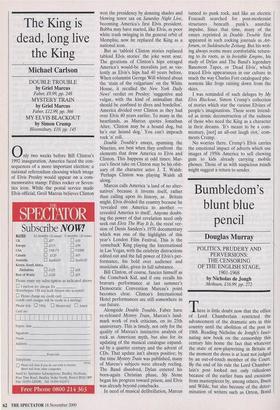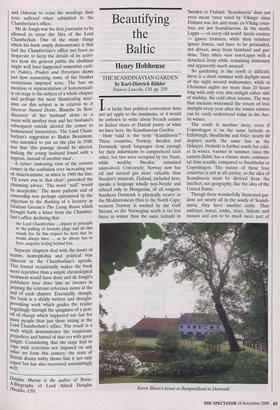Bumbledom's blunt blue pencil
Douglas Murray
POLITICS, PRUDERY AND PERVERSIONS: THE CENSORING OF THE ENGLISH STAGE, 1901-1968 by Nicholas de Jongh Methuen, £16.99, pp. 272 There is little doubt now that the office of Lord Chamberlain restricted the advancement of the dramatic arts in this country until the abolition of the post in 1968. Reading Nicholas de Jongh's fasci- nating new book on the censorship this century hits home the fact that whatever the state of new-playwriting in Britain at the moment the dross is at least not judged by an out-of-touch member of the Court. By the end of his rule the Lord Chamber- lain's post looked not only ridiculous because of the earlier bans and excisions from masterpieces by, among others, Ibsen and Wilde, but also because of the deter- mination of writers such as Orton, Bond and Osborne to resist the maulings their texts suffered when submitted to the Chamberlain's office.
Mr de Jongh was the first journalist to be allowed to scour the files of the Lord Chamberlain. One of the many things which his book amply demonstrates is that had the Chamberlain's office not been so desperate to keep the details of its activi- ties from the general public the abolition might well have happened somewhat earli- er. Politics, Prudery and Perversion shows just how nauseating some of the blanket restrictions imposed were. The ban on mention or representation of homosexuali- ty on stage is the subject of a whole chapter and perhaps the most illuminating anec- dote on this subject is in relation to A Streetcar Named Desire. Blanche du Bois' discovery of her husband alone in a room with another man and her husband's subsequent suicide alerted the censor to homosexual innuendoes. The Lord Cham- berlain's suggestion to Binkie Beaumont, who intended to put on the play in 1948, was that 'this passage should be altered, making the young husband found with a negress, instead of another man'.
A rather endearing view of the censors comes in the confusion over increasing use of Americanisms, as when in 1960 the line, I'll screw you in that chair', provoked the charming advice, 'The word "nail" would be acceptable.' The more pathetic end of censorship was perhaps epitomised by the objection to the flushing of a lavatory in Graham Greene's The Living Room which brought forth a letter from the Chamber- lain's office declaring that
the Lord Chamberlain ...objects in principle to the pulling of lavatory plugs and all that stands for. In this respect he feels that he would always have ... as he always has to have, majority feeling behind him.
Separate chapters deal with the issues of sexism, homophobia and political bias inherent in the Chamberlain's agenda. This format occasionally makes the book more repetitive than a simple chronological treatment would have done and de Jongh's publishers have done him no favours in Printing the relevant reference notes at the end of each chapter. Essentially, though, the book is a slickly written and thought- provoking work which guides the reader beguilingly through the quagmire of a peri- od of change which happened too fast for more people than just those sitting in the Lord Chamberlain's office. The result is a Work which demonstrates the suspicions, prejudices and hatred of that era with great insight. Considering that the stage had to cope with restraints not imposed on any other art form this century, the state of British drama today shows that it not only coped but has also recovered astonishingly Douglas Murray is the author of Bosie: A Biography of Lord Alfred Douglas (Hodder, £20).



































































































 Previous page
Previous page